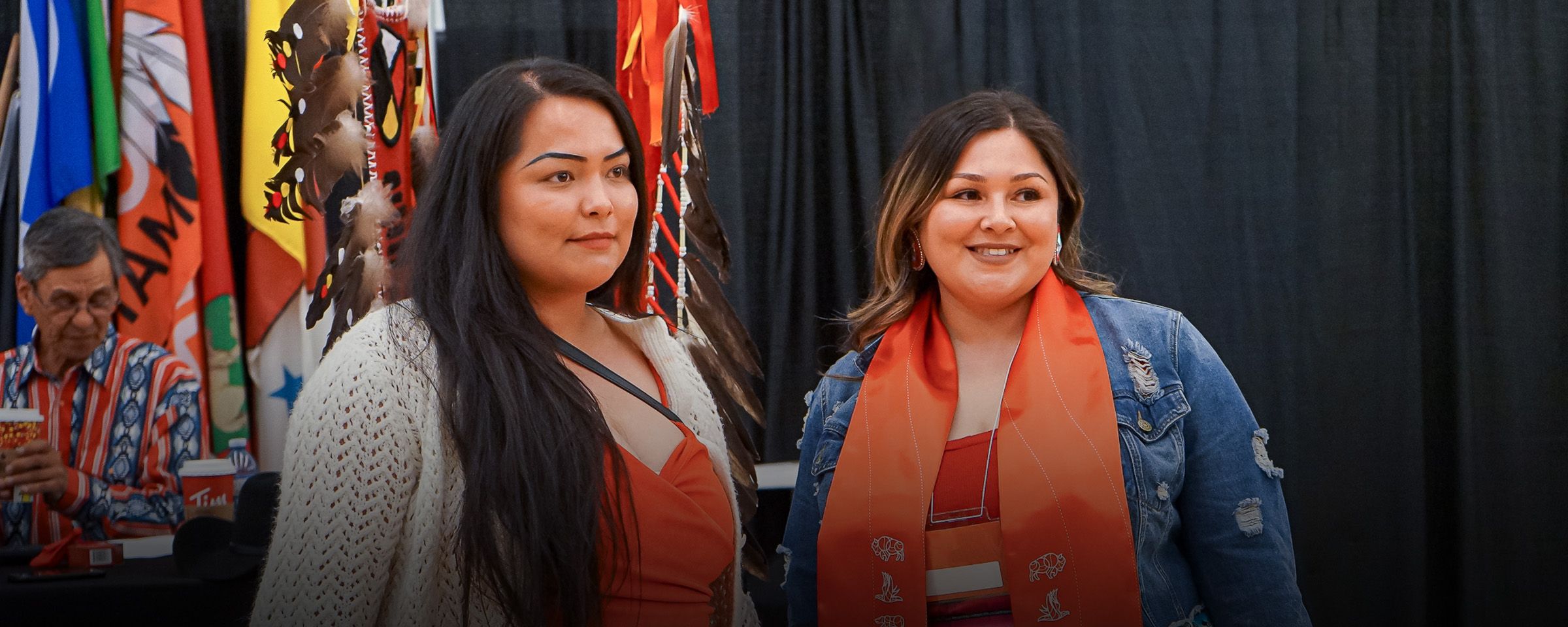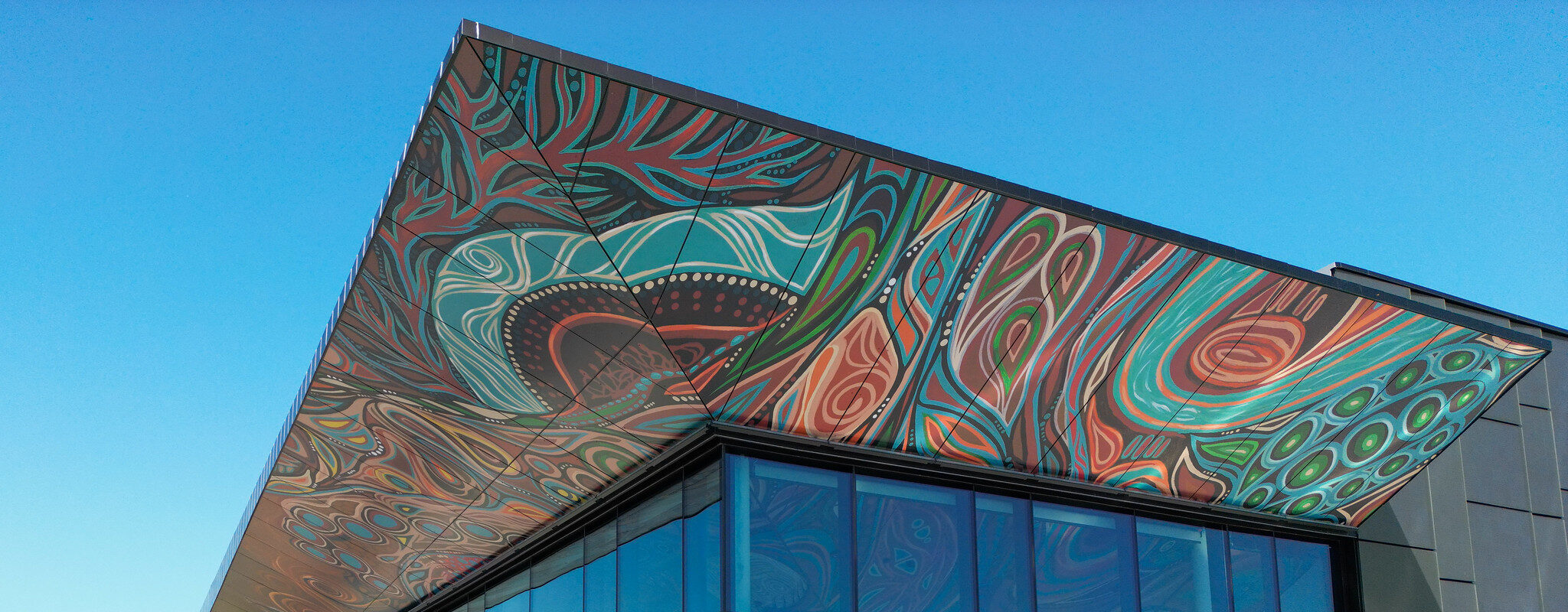Student trio enters federal mentorship program
The program is focused on increasing female representation in science fields and integrating Indigenous knowledge.
Three students from RRC Polytech’s Social Innovation and Community Development program have been accepted into Natural Resources Canada (NRCan)’s Sistering Indigenous and Western Science Program (SINEWS), one of eight national teams accepted for 2023.
SINEWS provides mentorship and supports to pairs of students or recent graduates to increase engagement with Indigenous and non-Indigenous women in scientific disciplines, and one team member must be Indigenous.
The program made an exception for the RRC Polytech team of three: Sharon-Rose Bear, a Cree woman from Muskoday First Nation in Saskatoon, Brooke Hardling-Boboski from Winnipeg, and Tayla Fernandes Agostinho, an international student from Brazil.
“It’s a major step up to be working with government scientists on a real community research project,” said Bear. “The three of us know our different passions, strengths, and weakness and we are much more confident to take this on as a full team.”
Supporting Indigenous communities
The team is responsible for proposing, developing, implementing, and reporting on research projects over four to eight months and integrating traditional Indigenous knowledge and research practices into western science for a more holistic approach to their research. The RRC Polytech team will focus their project on researching solid waste management practices.
“I’m really keen to work with Elders to learn how solid waste is affecting their community, and how their waste management practices have changed over time,” said Bear. “We also want to discover the impact that these practices are having on the environment.”
The students receive hands-on support and guidance from the SINEWS secretariat, Elder-in-Residence, NRCan scientists, and community Knowledge Keepers. SINEWS provides each student group with a $10,000 budget for research expenses and a $4,000 training allowance. All resulting research will be owned and used by the Indigenous community partner.
Jamie Wolfe, SINEWS Program Manager, noted the “reverse mentorship” that the students provide to existing employees and mentors.
“They often bring fresh perspectives on how to approach the research in culturally appropriate ways, as well as establishing respectful relationship-building practices and ethics protocols while engaging with communities,” said Wolfe.
Indigenous education and mentorship at RRC Polytech
Bear – a single mom of two – just finished her second year of Social Innovation and Community Development and plans to enter the Indigenous Social Entrepreneurship program next year.
On top of her academic studies, Bear volunteered with RRC Polytech’s Indigenous Student Support & Community Relations R-Crew over the past year, where she supported and encouraged other Indigenous students while assisting with various duties.
“With R-Crew, I’ve been able to interact with Elders and advisors on a regular basis who, along with several influential instructors, have been mentors or role models for me,” said Bear. “They’ve given me the support to be a successful student and the confidence to take on an opportunity like SINEWS and be excited for my career.”
One of those role models has been Indigenous Education instructor and official SINEWS mentor Ginger Arnold, who identified the opportunity and supported the students in applying for the program.
“This is such an exciting opportunity for students to elevate their skills and experience while getting their foot in the door with the federal government and making a real impact on an Indigenous community,” said Arnold.
Practicing Truth and Reconciliation
Bear acknowledged that it is not uncommon for non-Indigenous students to have negative pre-conceptions about Indigenous people, “but usually once they learn the historical Indigenous context, such as what is taught at RRC Polytech, it opens their eyes.”
Bear believes reconciliation is a two-way street.
“Personally, working with people who come from different cultures with different worldviews has really benefited me – it helps me open my mind to see from other perspectives, and see the bigger picture.”
RRC Polytech’s Strategic Plan 2022-2026 prioritizes Indigenous achievement with its second strategic commitment: Embedding Truth and Reconciliation and Equity, Diversity and Inclusion in everything the College does.
“Indigenous knowledge is integral to approaching research holistically and ethically, especially when it affects Indigenous communities; Indigenous RRC Polytech students are actively changing the way we do things and think about things, and it’s amazing to see that extend to industry and community,” said Jamie Wilson, VP, Indigenous Strategy, Research, and Business Development at RRC Polytech.
Identifying these opportunities and encouraging students to pursue them are just one facet of supporting Indigenous achievement. As a polytechnic, RRC Polytech provides students with the training and experiential learning opportunities they need to start making an imminent difference before they even graduate and make the impact they want to see in the world.

